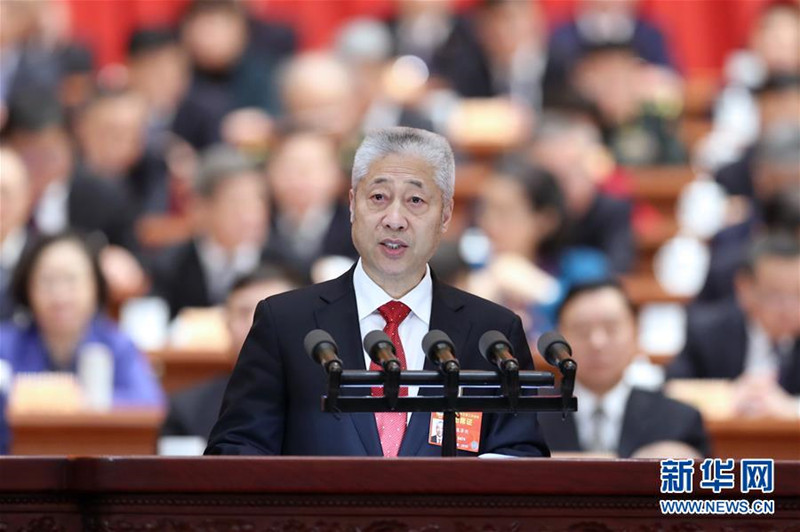Deepening cross-Straits non-governmental exchanges in new era

Zhang Zexi, a member of the National Committee of the CPPCC, delivers a speech on behalf of the Central Committee of the Taiwan Democratic Self-Government League. [Photo/Xinhua]
The fourth plenary meeting of the second session of the 13th National Committee of the Chinese People's Political Consultative Conference was held at the Great Hall of the People in Beijing on March 11, 2019. This is the speech delivered by Zhang Zexi, a member of the National Committee of the CPPCC, on behalf of the Central Committee of the Taiwan Democratic Self-Government League.
Although the Democratic Progressive Party authorities in Taiwan refuse to recognize the 1992 Consensus that embodies the principle of one China, which has blocked the cross-Straits institutionalized consultation mechanism, the CPC Central Committee's guidelines and policies have won the hearts of the people on both sides of the Straits.
The exchanges have shown vigorous development.
Firstly, the exchanges have been expanded to various fields and conducted regularly in an experiential, interactive, and integrated way.
Secondly, Taiwan compatriots deeply feel the goodwill of the mainland and have benefited from exchanges and cooperation. For example, more and more young people in Taiwan are aware of the ever-changing development and dramatic changes in the Chinese mainland, and are willing to come to the mainland to seek opportunities.
Third, the measures on accelerating cross-Straits economic and cultural exchanges issued by 31 departments including the State Council's Taiwan Affairs Office and the National Development and Reform Commission are playing an increasingly important role in promoting more frequent and closer exchanges between people on both sides of the Straits.
I hope that the Chinese will help the Chinese. Wang Yang, chairman of the 13th National Committee of the Chinese People's Political Consultative Conference, made a request to deepen exchanges with relevant Party groups and people on the island of Taiwan in his work report of the standing committee of the CPPCC National Committee.
I suggested that we should promote the cross-Straits non-governmental exchanges in a sustainable way and create more development opportunities for compatriots, so that non-governmental exchanges can play a more essential role in the great cause of the reunification of the motherland.
First, we should set up a targeted approach and strive for practical results. It is necessary to review and summarize the experiences for cross-Straits non-governmental exchanges over a period of time.
On this basis, we should carefully plan the content, avoid potential problems, continuously innovate and effectively deepen the ties. Under the guidance of the 31 measures for promoting cross-Straits economic and cultural communication and cooperation, we ought to optimize supporting polices such as data, technology, and funding on the one hand; on the other hand, we should highlight personalized services and constantly enhance the sense of belongings for the people on the island.
Second, we should broaden the channels of communication and focus on grassroots-level exchanges. Although cross-Straits exchanges have become more frequent in recent years, some two-thirds of the people on the island of Taiwan have not yet visited the Chinese mainland.
We should pay great attention to the central and southern parts of the island and open up channels to vigorously promote cooperation and exchanges with grassroots townships and villages as well as urban communities, farmers and fishermen's organizations and women's associations.
We should make better use of the cross-Straits exchange platforms and learn from the good experiences. Also, we should extensively deepen cooperation between compatriots across the Straits and attract more people in sectors such as the inheritance and activation of intangible cultural heritages, modern design and cultural and creative marketing.
Third, we should focus on long-term development and center on key points. The future of cross-Straits relations lies in young people. A survey shows that the proportion of young people in Taiwan going to the Chinese mainland for study and work has continued to increase.
Taking multiple measures is recommended to continuously expand exchanges between the younger generations across the Straits, such as planning internships and trainings for Taiwan students, further improving the scholarship systems for them, and offering support for entrepreneurship of Taiwan youth. More and more Taiwan youth are coming to the mainland, which has become a new force to promote the peaceful development of cross-Straits relations.
Copyright © The National Committee of the Chinese People's Political Consultative Conference.
All rights reserved. Presented by China Daily.
京ICP备08100501号-1

